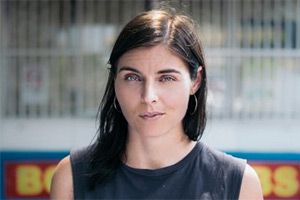Ange Lavoipierre on the renewed appreciation for absurdism

After several years making comedy about Important Things™ I decided to write one about nothing.
I wanted to write the show about a very particular kind of nothing though. (Because not all nothings are created equal.)
Take Seinfeld, the Bonjela of TV.
If you haven't tried Bonjela yet, you should! The pharmacist will tell you it's for teething babies but if you make strong eye contact and ask again assertively, congratulations, the Bonjela is yours.
Like Bonjela, the nothingness of Seinfeld is slightly sweet, and mildly anaesthetic. Jerry hurts his foot, Elaine dates a guy from the IRS. Jerry fraudulently tries to claim his trip to the podiatrist as a deduction and over sundaes, Elaine inadvertently exposes Jerry to an audit. B plot: the other two male characters accidentally swap hats. It's been a while, but this is the overall Bonjelaness of Seinfeld. Nothing actually happens but crucially, the world still makes sense.
Absurdism is different. It's often ostensibly about nothing, but it's definitely not Bonjela.
If you want to get technical, absurdist humour is predicted on "deliberate violations of causal reasoning".
It's Tim Robinson on I Think You Should Leave crashing his hot-dog-shaped car into a shop, dressed in a hot-dog costume, and emerging from the rubble to declare, "We're all trying to find the guy who did this!"
It's Viggo Venn winning Britain's Got Talent with 10 to 15 hi-vis vests and the same 20 seconds of a Daft Punk song on repeat.
It's Seinfeld but in this version, Elaine dates the sundae and Jerry audits the IRS.
Absurdism is a nod to the void, but rather than saying "Dear god, no" it says "Wowee, what a nice deep void, what if I put my head in it?"
That second kind of nothing, the hotdog car/hi-vis/whistling into the abyss, is one response to the senselessness of the world. Clinical depression is another.
But in the words of Albert Camus, "One must imagine Sisyphus happy."
Maybe even laughing.
By choosing to push the boulder back up the hill each day, Camus' Sisyphus finds meaning in actively defying the senselessness of the world with an absurd response.

There's a renewed appreciation for the absurd in 2023, and it's no coincidence. All this nothing has a point.
Camus formed his perspective amidst the second world war, the French occupation, and colonialist oppression in his home country of Algeria.
His generation of absurdists was forged by the violent geopolitical upheaval of the 20th century, when the morality of the world they were delivered did not accord with the one they were promised.
People born after 1980 have experienced a bait and switch too, albeit in a different way. We were theoretically poised to inherit the end of history; the internet was incipient, totalitarianism had lost (ha, ha) and Donald Trump was still a realtor or something.
But instead of this inheritance, we got perma-crisis: late-capitalism, climate change, YouTube conspiracy theories about water, the disintegration of the political centre, a pandemic, chronic housing instability, and the structural inability to accrue any personal wealth.
"You will own nothing and you will be happy," we were told in a 2016 World Economic Forum essay.
The first part at least is accurate, and coupled with what feels like a permanent fragmenting of our shared cultural reality and a backsliding civil discourse, it's given rise to a collective sense that the future is failing to arrive.
To be fair, the hotdog car crash would have been funny in any moment of the postmodern era, but if you see more of them around than usual, there's a reason. They're not a cure, but they are the medicine of a generation.
Help British comedy by becoming a BCG Supporter. Donate and join us in preserving, amplifying and investing in comedy of all forms, from the grass roots up. Advertising doesn't cover our costs, so every single donation matters and is put to good use. Thank you.
Love comedy? Find out more
